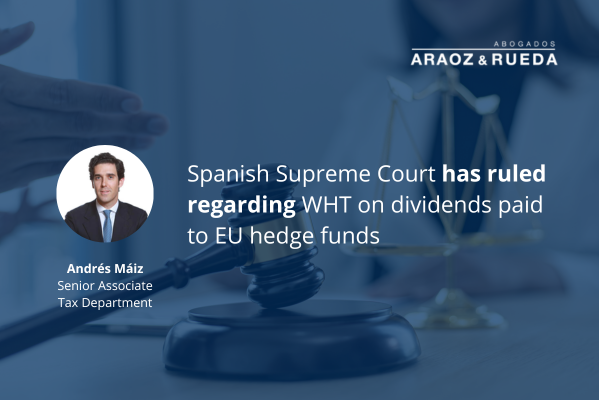On 13 March 2021, Royal Decree-Law 5/2021, of 12 March, on extraordinary measures to support business solvency to tackle COVID-19 pandemic (the “RDL 5/2021”), was published in the Spanish Official Gazette (Boletín Oficial del Estado).
Measures to support business solvency approved during the last year and, in particular, those envisaged in RDL 5/2021 for an amount of EUR 11 billion, have been targeted to viable companies operating in the most affected sectors. With these measures, the intention is to prevent solvency and over-indebtedness problems in those companies which, under normal market conditions would be viable, but that in the context of the pandemic could hinder economic recovery.
RDL 5/2021 established the following levels of action:
a) EUR 7 billion of direct aid package aimed at reducing indebtedness and channeled through the Spanish Regions (Comunidades Autónomas).
b) Debt restructuring for companies with a higher level of financial debt. This measure had a budget of EUR 3 billion.
c) And the creation of a EUR 1 billion public fund managed by COFIDES to capitalize medium-sized companies in need of additional support.
The measures linked to debt restructuring are intended to alleviate the financial burden of these companies, and are to be implemented within a framework of collaboration between the financial institutions that granted the financing transactions with public and State guarantees or coverage.
This framework of co-transaction is provided by the set of measures set out in the Code of Good Practices, approved by the Secretary of State for Economic Affairs and Business Support (Secretaria de Estado de Economía y Apoyo a la Empresa) on 11 May (the “Code of Good Practices” or the “Code”), which is voluntary for financial institutions to adhere to. In this light, the period of adherence shall be one month, subject to the possibility that further periods of adherence are approved.
The adhesion to the Code implies, for the adhering institution, the assumption of certain commitments. These commitments are aimed at adopting measures on the loans and improving coordination with other institutions, in order to offer alternatives to the customers whose financial situation has been particularly damaged by the pandemic.
1. Measures, commitments and criteria under the Code
Main measures provided for in the Code are as follows:
a. Extension, at the request of the debtor and provided that the eligibility criteria set out in the Code is met, of the maturity of financing transactions that have received a public guarantee. We analyze the limits and conditions of this measure in point 4 below.
b. Considering the possibility of converting publicly guaranteed financing transactions into non-convertible equity loans. The development of this measure is detailed in point 5 below.
c. Assessing the reduction of the principal of those transactions that have a public guarantee, in accordance with the terms and conditions provided by the Code. In this regard, the Code sets out the possibility that, in the event of reductions in the principal, the financial institution may claim payment from the guarantor of the quota of the reduced amount covered by the guarantee. We provide further detail of this measure in point 6 below.
We must remark that, according to the Code, measures b. and c. above are considered voluntary, and will only be applicable if the conditions set out below are met.
Together with these measures, the Code establishes a series of commitments to be undertaken by financial institutions in the application of such measures. In particular:
a. To the extent that the measures are implemented, the Code requires financial institutions to review all of the debtor’s transactions, both guaranteed and non-guaranteed, entered into from 17 March 2020 to 13 March 2021. In this regard, in the event of any changes to the terms of guaranteed transactions, financial institutions must relax the terms of non-guaranteed transactions.
b. In addition, the Code provides that, in the event of granting the debtor any of the above-mentioned measures, the financial institutions shall keep in force the working capital lines granted to the debtor, at least until 31 December 2022.
c. Together with the above commitment, financial institutions must also undertake not to make the granting of the measures conditional on the commercialization of other products.
d. Alongside the above, in the event that any of the measures is implemented, the financial institution may not increase the cost of the guaranteed financing transactions by an amount greater than the increase in the cost of the public guarantee, if any.
e. Finally, the measures taken may not be grounds for early termination under any of the transactions that the debtor had entered with the financial institution.
Further, the Code sets out a number of criteria, which the adhering entities must follow:
a. In the evaluation of the measures that may result applicable, the entity shall select the measure or measures that best meet the needs of enterprises and the self-employed, while ensuring the best use of public resources.
b. For this assessment, the institution shall decide on the measures to be taken in relation to the debtor’s transactions, in accordance with its internal procedures and its lending and risk policies.
c. Finally, all the adhering institutions must collaborate with each other in good faith to reach agreements among themselves, with the ultimate aim of achieving the most effective solution for those debtors who have transactions with more than one institution.
2. Coordination measures between entities
In line with point c. above, and together with the measures already analyzed, the Code introduces a series of coordination measures between institutions, in order to facilitate the overall renegotiation of the position of customers.
Thus, and to the extent that the debtor has guaranteed transactions with several financial institutions, the application should be addressed to the institution adhering to the Code with which it has the largest overall debt position with a public guarantee.
From that moment on, the financial institution with this majority position will assume, among other obligations, the task of coordinating and informing the other creditor institutions. As coordinating entity, the Code establishes that this entity must, within one month of receiving all the necessary documentation, inform the rest of the adhering creditors and make a proposal on the measures that could be applied to the financing transactions, both guaranteed and non-guaranteed, contracted by the debtor.
The coordinating institution and the other member institutions must take a joint and binding decision on the measures to be applied to the customer (company or self-employed). In this way, the aim is to ensure that the eventual losses assumed be distributed among the different institutions in a fair manner and proportionally to the exposure of each of the institutions. In order to make this decision, the Code establishes the following system of majorities, with respect to those transactions involving guaranteed debt:
a. The conversion into a participating loan shall require the favorable agreement of the member institutions representing more than 50% of the outstanding amount of the debtor’s guaranteed financing; and
b. For the application of write-offs or reductions, this percentage is increased to 66% of the outstanding amount of the debtor’s guaranteed financing.
These coordination rules exclude secured transactions with in rem securities (garantías reales). On the other hand, in order to apply the agreed measures to transactions with co-obligors or guarantors of any kind, ratification from them will be required regarding the maintenance of their obligations.
With regard to unsecured debt transactions, the measures will only be mandatory if 100 % of the participating creditors agree to the measures. If this is not the case, it will be up to each institution whether or not to apply measures in respect of such transactions.
3. Requirements for the implementation of the measures
In this section, we analyze the requirements and eligibility conditions for companies and the self-employed to benefit from the measures provided for in the Code.
Pursuant to Section Four of the Code, maturity extensions of financial transactions with public guarantees will require, in addition to those provided for in Additional Provision Four of RDL 5/2021:
- The debtor’s prior application.
- The financing transaction not to be in arrears (i.e. unpaid for more than ninety days), nor any of the other financing granted by the entity to the same customer.
- That the debtor does not appear in a situation of default in the consultation of the CIRBE (Central de Información Riesgos del Banco de España) files.
- That the financial institution has not notified the entity granting the guarantee of any non-payment of the guaranteed financing.
- The debtor not to be subject to bankruptcy proceedings.
- The guaranteed financing must have been formalized before 11 May 2021.
- The debtor’s application must be made before 15 October 2021.
- That the debtor complies with the limits established in the European Union’s State aid rules.
- That the debtor has not been convicted in a final judgment for offences against the Public Treasury and/or against Social Security, nor for offences of frustration of execution, insolvency or recovery.
- That turnover of the company or self-employed has been reduced by at least 30% in the financial year 2020 compared to the financial year 2019. Notwithstanding, in the event that this requirement is not met but the previous ones are, the debtor may benefit from the extension of the maturities of the guaranteed financing, provided that there is an agreement from the creditor entity granting the financing.
With regard to the eligibility requirements for the conversion of guaranteed financing transactions into non-convertible equity loans, the following requirements will be also necessary:
- The debtor’s profit and loss account for the year 2020 shows a negative profit after tax, and
- The debtor must provide a tax certificate accrediting compliance with the eligibility conditions for companies and the self-employed under RDL 5/2021.
Finally, requirements for the reduction of the principal amount of those transactions that have a public guarantee are the following:
- The debtor must provide a tax certificate accrediting compliance with the eligibility conditions for companies and the self-employed under RDL 5/2021.
- The debtor’s profit and loss account for the year 2020 shows a negative profit after tax; and
- The debtor has not been convicted in a final judgment for offences against the Public Treasury and/or against Social Security, nor for offences of frustration of execution, insolvency or recovery.
4. Extension of the maturity of financing transactions with public guarantees
Once the eligibility requirements have been analyzed, the following chart summarizes the maximum extension periods that can be agreed upon depending on two variables: (i) the amount of the debt with public guarantee that the debtor has subscribed, and (ii) the possibility that the debtor has benefited from the previous extension provided for in Royal Decree-Law 34/2020.
|
Amount of aid |
Previous Extension |
Maximum Maturity Period Extension |
|
Debtors who have subscribed an amount of ICO debt equal to or less than EUR 1,800,000, or EUR 270,000 if the company belongs to the fishing or aquaculture sector, or EUR 225,000 if the company belongs to the sector of primary production of agricultural products. |
Yes |
Two years (not to exceed ten years from the date of initial formalization) |
|
No |
Five years (not to exceed ten years from the date of initial formalization) |
|
|
Debtors who have subscribed an amount of ICO debt higher than EUR 1,800,000, or EUR 270,000 if the company belongs to the fishing or aquaculture sector, or EUR 225,000 if the company belongs to the sector of primary production of agricultural products. |
Yes |
Two years (not exceeding eight years from the date of initial formalization) |
|
No |
Five years (not to exceed eight years from the date of initial formalization) |
In addition, the remuneration applicable to guarantees (avales) is updated in line with the extensions. In any case, the cost of financing may be increased, but only to pass on the increase ¿to? the cost of the guarantee.
Together with the extension of maturities, the Code provides that the debtors and member institutions may also agree to extend the grace periods of the guaranteed financing, and must notify the ICO, CESCE or CERSA, as appropriate, of such circumstance.
Within forty-five calendar days, the member institutions must resolve the debtor’s request and, in the event that it is accepted, they shall notify the ICO, CERCA or CESCE, as appropriate, of the request to modify the terms of the public guarantee.
5. Conversions into non-convertible participating loans
As mentioned above, one of the measures provided for in the Code is the possibility for the debtor and the member institution to voluntarily agree on the conversion of guaranteed financing transactions into participating loans that are not convertible into equity.
In the event that the requirements for the application of this measure are met – as stated above – the member institutions will have a maximum of forty-five calendar days to resolve the debtor’s application and, if the application is accepted, they will notify the ICO, CERCA or CESCE, as appropriate, of the request to modify the terms of the public guarantee.
6. Reduction of the principal (“write-offs”) of transactions with a public guarantee
Under RDL 5/2021, the “Line for the renegotiation of COVID financial debt with a State guarantee” was created, with an allocation of EUR 3 billion. The purpose of this line is to meet the expenses arising from the measures to reduce the principal of transactions with a public guarantee.
Through this line, companies and the self-employed may request a reduction in the outstanding capital on the loans they have subscribed with adhering entities, by means of public transfers that will be paid directly through the relevant adhering institution.
These transfers shall be applied to the reduction of the outstanding capital including, where applicable, capital overdue, unpaid or with the security forfeited, if any.
In addition to the requirements mentioned above, in order to apply this measure, the member institution and the debtor must reach an agreement to renegotiate all the debt, guaranteed and non-guaranteed, generated between 17 March 2020 and 11 May 2021. In the case of transactions re-guaranteed by CERSA, the agreement must have the approval of the Mutual Guarantee Society (Sociedad de Garantía Recíproca), in addition to that of the financial institution granting the financing transaction.
The agreement, which must be reached by 1 December 2022, must state the amount by which the amount of the guaranteed financing will be reduced, up to a limit of 50% of the outstanding guaranteed principal, although exceptionally the amount of the transfer could be up to 75% in cases where the drop in turnover exceeds 70%.
Finally, the maximum transfer budget allocated to each public body is as follows: EUR 2.75 billion for guarantees managed by the ICO, EUR 100 million for guarantees managed by CESCE and EUR 150 million for guarantees managed by CERSA.





